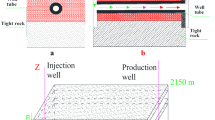Abstract
Technological solutions have been proposed for extraction of heat accumulated in hot dry rock with various energy potentials. To extract the heat of low-temperature dry rock mass is shown to be advisable to ensure low heat carrier flow rates in the DHE; so for the depths H = 100, 200 m, the water flow rate G = 0.5–0.6 kg/s is optimal. The technology is presented for a hybrid solar–geothermal system consisting of solar collectors and a DHE coupled with a heat pump. The practical application of this system is shown to be highly efficient. The technological outline of heat and hot water supply with heat extraction from low-enthalpy dry rock in the DHE has been developed. A low-boiling working media is proposed as a working body. Evaluation was carried out of the efficiency of heat extraction from dry rock mass by deep down-hole heat exchangers of different length. The calculations confirmed the possibility of output up to 1 MW of thermal power and more. The technology of enhanced geothermal system with rock hydraulic stimulation and horizontal wells has been developed, and estimations have been carried out on heat removal from rock mass in such a system.











Similar content being viewed by others
Explore related subjects
Discover the latest articles, news and stories from top researchers in related subjects.References
Alekseenko SV, Nizovtsev MI (2015) Features of the development of petro-thermal energy. In: Proceedings of the IV international conference renewable energy: problems and prospects, Makhachkala, 1, pp 29–39
Alimonti C, Soldo E, Bocchetti D, Berardi D (2018) The wellbore heat exchangers: a technical review. Renew Energy 123:353–381. https://doi.org/10.1016/j.renene.02.055
Alishaev MG (2012) Ultimate capacity when extracting the heat of dry hot rock. Proc Russ Acad Sci Power Eng 4:71–85
Alkhasov AB (2008) Geothermal energy: problems, resources, technology. Fizmatlit, Moscow
Alkhasova DA (2016a) Development of energy efficient technologies for extracting and using petrothermal energy for electric power needs. In: Proceedings of the international congress REENCON XXI renewable energy of the XXI century: energy and economic efficiency, Moscow, pp 86–90
Alkhasova DA (2016b) Design of technologies for the development of high-potential dry rock heat for electricity generation. In: Proceedings of the All-Russian science and technology conference on actual problems of applied mathematics and modern science: the theory and practice of current research
Alkhasova DA (2018) Removing the heat of dry rock using horizontal wells. In: Proceedings of the II international sci-practical conference actual issues of research of oil and gas reservoir systems, Moscow, p 78
Alkhasov AB, Alkhasova DA (2011) Harnessing the geothermal resources of sedimentary basins for electricity production. Therm Eng 58(2):153–161. https://doi.org/10.1134/S0040601511020029
Alkhasov AB, Alkhasova DA (2012) A system of heat supply and hot water supply based on renewable energy sources. Patent No 2445554
Alkhasov AB, Alkhasova DA (2018a) Heat exchangers for utilization of the heat of high-temperature geothermal brines. Therm Eng 65(3):155–159. https://doi.org/10.1134/S0040601518030035
Alkhasov AB, Alkhasova DA (2018b) Evaluating the effect from constructing binary geothermal power units based on spent petroleum and gas boreholes in the south regions of Russia. Therm Eng 65(2):98–105. https://doi.org/10.1134/S0040601518020015
Alkhasova DA, Alkhasov BA (2018c) Harnessing the heat of dry rocks of high energy potential. In: Proceedings of the XI school of young scientists actual problems of the development of renewable energy resources, pp 250–258
Alkhasov AB, Alishaev MG, Israpilov MI, Badavov GB (2008) Prospects for use in exhausted petroleum fields of borehole heat exchangers and artesian water-bearing horizons for supplying heat and hot water. Therm Eng 55(12):1009–1016. https://doi.org/10.1134/S0040601508120057
Alkhasov AB, Alishaev MG, Alkhasova DA, Kaimarazov AG, Ramazanov MM (2012) Development of low-enthalpy geothermal heat. Fizmatlit, Moscow
Bezrukhikh PP (2002) Resources and efficiency of renewable energy utilization in Russia. Nauka, Moscow
Dyadkin YD (1991) The main directions of geothermal technology development. Geothermy, Moscow, pp 10–17
Falcone G, Liu X, Okech RR, Seyidov F, Teodoriu C (2018) Assessment of deep geothermal energy exploitation methods: the need for novel single-well solutions. Energy 160:54–63. https://doi.org/10.1016/j.energy.2018.06.144
Gnatus NA, Khutorskoy MD (2010) Heat of “dry” rocks” is an inexhaustible renewable energy source. In: Proceedings of the II international conference on renew energy: problems and prospects, Makhachkala, pp 76–80
Jiang P, Li X, Xu R, Zhang F (2016) Heat extraction of novel underground well pattern systems for geothermal energy exploitation. Renew Energy 90:83–94. https://doi.org/10.1016/j.renene.2015.12.062
Morozov YuP (2014) The efficiency of heat extraction from the rock mass using the borehole. Int Sci J Altern Energy Ecol 23:49–52
Olasolo P, Juárez MC, Morales MP, D´Amico S, Liarte IA (2016) Enhanced geothermal systems (EGS): a review. Renew Sustain Energy Rev 56:133–144. https://doi.org/10.1016/j.rser.2015.11.031)
Petin YuM, Nakoryakov VE (1997) Heat pumps. Rus J Gen Chem 6:107–111
Ruth Shortall, Brynhidur Davidsdottir, Guðni Axelsson (2015) Geothermal energy for sustainable development: a review of sustainability impacts and assessment frameworks. Renew Sustain Energy Rev 44:391–406. https://doi.org/10.1016/j.rser.2014.12.020
Ryzhenkov VA, Martynov AV, Kutko NE, Nikifirova DV (2009) About the possibility of using the heat of deep rock of the earth for electricity and heat supply of detached consumers. J Energy Sav Water Treat 1:12–16
Shyi-Min Lu (2018) A global review of enhanced geothermal system (EGS). Renew Sustain Energy Rev 81(2):2902–2921. https://doi.org/10.1016/j.rser.2017.06.097
Zhang Wei, Zhanqing Qu, Guo Tiankui (2019) Zhiyuan Wang Study of the enhanced geothermal system (EGS) heat mining from variably fractured hot dry rock under thermal stress. Renew Energy 143:855–871. https://doi.org/10.1016/j.renene.2019.05.054
Author information
Authors and Affiliations
Corresponding author
Additional information
Publisher's Note
Springer Nature remains neutral with regard to jurisdictional claims in published maps and institutional affiliations.
Rights and permissions
About this article
Cite this article
Alkhasova, D.A. Technological design and efficiency assessment of heat production from dry rock with different energy potential. Geomech. Geophys. Geo-energ. Geo-resour. 6, 5 (2020). https://doi.org/10.1007/s40948-019-00128-x
Received:
Accepted:
Published:
DOI: https://doi.org/10.1007/s40948-019-00128-x




